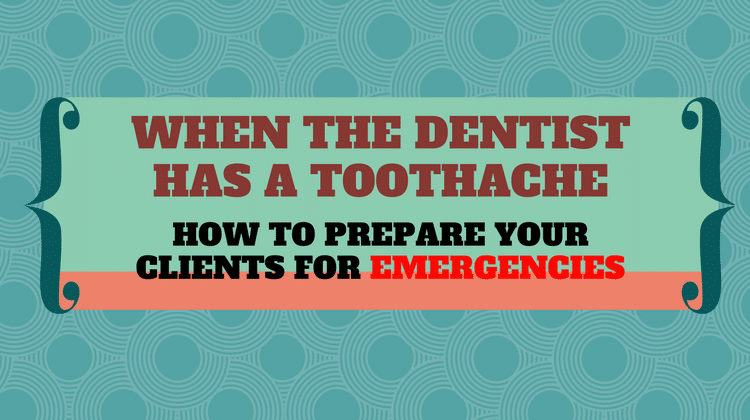
You are going along in your small solo business, working with clients, dealing with all the little tasks that need to be done to grow your business. Then, BAM! Something happens. It might be something personal, like a breakup or death in the family, or an immediate family crisis, like a babysitter who doesn’t show up or a car that doesn’t work. Or it might be, as happened to my dentist friend Linda, a toothache!
How will you deal with these emergencies in your life and still keep your small business running and responsive to clients? Your customers don’t really care if you have a toothache or your dog died; they have their own deadlines and bosses breathing down their necks. They certainly will understand something major like a death in the family. But they won’t be happy if you disappear from your business for an extended length of time.
Planning now for both short-term and long-term situations can relieve your stress and keep your good relationship with clients. Here are some tips for the times when stuff happens:
1. Prepare clients.
If your mother is dying, give your clients a heads-up. You don’t have to tell them the entire story (save that for your best friend), but give them enough information about the possible timeline that they can decide how they will deal with your being gone.
2. Discuss availability at the start of the relationship.
If you have potential babysitter or other emergency situations, let your clients know you may not be available at short notice. If you don’t want to work weekends, say that up front; don’t wait until the customer calls with an emergency and you are put in an awkward situation. Sure, you can make exceptions, but remember that it’s always easier to have the expectation set in the beginning and make exceptions later.
3. Don’t dwell on it with clients.
Tell clients the minimum they need to know. Don’t waste their time stressing over the problem or asking their advice. People really do understand, but business is business, and bringing your personal problems into your work makes you look less than professional.
4. Plan for coverage.
With children and a business, you need backups for your backups. Make sure you have at least two potential babysitters lined up. The same backup advice goes for other short-term emergencies. If you have friends in the same type of business, you may be able to cover for each other in these situations. Doctors do it all the time; giving your clients an alternate will please them more than not having the service they need.
5. Consider clients individually.
Some people will always be more understanding than others. Newer clients may not be as understanding as long time people. We develop personal relationships more easily with some clients, and you may be able to tell them a little more and get some slack. Other clients, you know from experience, will be less understanding. Think about which are which and how you will handle those situations.
How to Plan for Emergencies
Take an hour and make a list. It might be scary to think of all the awful things that can happen to you that might take you away from your business, but do it anyway. Group the scenarios into two categories:
Category A is short-term emergencies. These are the unexpected situations that might come up to take you away from your business for a couple of hours or days. Looking at your list of possible situations, decide how to best handle each one. For each situation, ask yourself: Who can I call? How will I inform my current clients? Which clients will need special handling?
One situation needs special consideration: What happens if you lose power or are unable to get to the phone or internet for a period of time? That has happened to all of us briefly. If this loss is for an extended time, you don’t want to lose clients. Do you have a landline you can use? (You know, that thing that used to hang on the wall in your kitchen, with a long cord on it.) Do you have a neighbor with one of those landline things? Where’s the nearest wi-fi hotspot?
Category B is the long-term situations that might cause you to have to stop or lessen your time on your business. How will you inform your clients? What parts of your business must you keep up and what parts can be given to someone else? How will the handoff be handled?
When you have completed the exercise, put your emergency plans in a file on your computer or in your office. Include important contact information for everyone on your list. You will find that having these what-if scenarios thought through and written is a huge stress reliever, and it will shorten your response time.
Planning for short-term emergencies and life-changing situations will help you deal with whatever happens. Your planning and good communication with clients will keep them happier. You aren’t superwoman, but you can make people think you are by having your act together when stuff happens.
About the Author
Jean Wilson Murray, PhD has been helping people start and successfully run small businesses for over 35 years. She is a successful small business coach, author, entrepreneur, and publisher. Jean is currently coaching through Frugal Business Secrets, helping small business owners save money, work smarter, and simplify their businesses. She has a website, book series and (soon) a podcast and online course.
In addition to teaching and writing about small business, Dr. Murray has owned several successful solo businesses, including her most recent venture, Murray Business Solutions LLC, a small business startup consulting company, with emphasis on bookkeeping setup and business startup consulting.
Wow, I never even thought about this. Luckily I have more than just me working but if it was just me I wouldn’t be prepared. Time to get ahold of my clients!